by Joe Loizzo, MD, PhD
Love and compassion are necessities not luxuries.
Without them humanity cannot survive.
—HH, the Dalai Lama
As a Buddhist psychotherapist and member of a diverse community focused on psychological healing, East and West, my heart is broken over the ongoing catastrophe in the Middle East that began with the Hamas attack on October 7th, 2023. I grapple with how to be helpful to our community, our kin in Gaza and Israel, and our larger human family at this crucial time. Tragically, just when those in the line of fire and those of us witnessing the death and destruction from afar most need to come together as an extended human family to provide protection, aid and care, we find ourselves caught up in the very divisions that have fueled the Middle East conflict over the last century. Given the polarizing atmosphere surrounding this crisis, it is not easy to engage in deep conversation around what is happening without aggravating those divisions, along with the othering and traumatic reactivity they activate. At the same time, saying nothing in the face of the horrific attack of October 7th and the genocidal violence and exponential loss of innocent civilian life in Gaza feels abandoning and inhuman.
[download the full article in PDF format]
In sharing this reflection, it is my heartfelt wish to trace the deep roots of this conflict, in the hopes that it may help open the door to the kind of dialogue we need to stop the violence once and for all and move towards reconciliation. I also hope to share my daily practice of holding the ongoing tragedy while working through my own traumatic reactivity, so that I can resist the tendency towards othering, cut to the root causes of the harm taking place, and learn whether and how I might be of genuine help. This work feels doubly challenging since I teach and do psychotherapy with people whose lived experience sensitizes them to the pain of this tragedy as seen from diverse, seemingly incompatible points of view.
Tracing the Roots
How (and Why) the Christian Colonial West Turned Jews and Muslims Against Each Other
What are the root causes of today’s devastating war in Gaza? As an immigrant whose Sicilian ancestors farmed for tens of thousands of years just a few hours from Palestine, I see the people on both sides of this conflict as my kin. As a student of history, I know that Muslims and Jews have generally lived peacefully as neighbors under Islamic law for most of the last two millennia, including four centuries in Sicily and thirteen in Palestine. I also know that the two main targets of white Christian Europe’s genocidal violence prior to the modern era of world colonization were my Muslim and Jewish kin. I know that when Jews were expelled from England, France, Spain, Russia, Germany, Italy and the Austro-Hungarian Empire in the centuries before Europe’s global colonization, many were welcomed to settle in the Islamic countries of North Africa, Anatolia and the Middle East.
In my mind, this history raises an obvious question. Since Palestinians and Jews not only peacefully co-existed for centuries, sharing a common enemy in Christian Europe, but also share closely related languages, ethnic origins, genetic legacies and spiritual roots, how did they come to be locked in so violent and intractable a conflict over the last three generations? As a newcomer to the U.S. in the 1960’s, struck by the deep divides I witnessed between groups that seemed like natural allies—BIPOC and white working poor, BIPOC feminists and white feminists, Jewish and BIPOC targets of white supremacy—conflict between the two main historical targets of Europe’s Christian nationalism—Jews and Muslims—seemed to fit the same pattern. In that conflict I recognized the stamp of the “divide and conquer” strategy used for centuries by European elites to enact their imperial ambitions, all culminating in their global colonial land-and-wealth-grab, including the inhuman othering and violence of enslavement, dispossession and genocide. I started looking for where those same elites divided these two natural allies.
I didn’t have to look far. In 1917, British Foreign Secretary Arthur Balfour sent a declaration to the newly formed Zionist community of England and Ireland promising to establish “…a national home for the Jews in Palestine,” in exchange for their military help fighting the Ottoman Empire’s centuries-old Muslim rule in the region. The declaration advanced a foreign policy inaugurated by Lord Palmerston in the 1840’s: to encourage the emigration of British Jews to Palestine to create an imperial footprint in the Middle East. It involved arbitrarily carving up the Ottoman Empire with France and Russia, claiming a “mandate” to occupy Palestine, and allowing the sale of land within it to non-resident Jewish individuals and groups.
At the time, Zionism was only twenty years old, the brain child of the Austrian Theodor Hertzl and a handful of secular Jews convinced that the only way to protect the Jewish people from Christian antisemitism was to take a page from Christian Europe’s imperialist playbook. The plan was to colonize part of the historic homeland of the Jewish people and displace the indigenous, overwhelmingly Muslim population living on that land. In light of the history of Europe and the Middle East, the plan proposed what amounted to a Jewish European crusade. Zionism at that point had been critically received by most of the Jewish community, especially religious Jews, as a secular political project contrary to their moral values and cultural legacy.
The tide began to turn when the Ottoman Empire collapsed in 1922, and the British proclaimed a colonial mandate in Palestine, promoting large scale Jewish immigration and the establishment of a Jewish state. Britain’s plan to enlist European Jews as proxy colonizers came to fruition when the British mandate ended after World War II, with the influx of Jewish refugees from the Holocaust, and the UN plan to partition Palestine into Israeli and Palestinian states. This led to the 1948 civil war between the Arab population and Zionist militias, culminating in the expulsion of 750,000 Palestinians from their homes into the Gaza strip, the catastrophe Palestinians call “the Nakba.” So while Zionists entered the picture as willing pawns in the European project of global colonization, by 1948 they fully stepped into the role Balfour cast them in: Britain’s proxy colonizers. As the heirs to the global colonizing engine of the British Empire, the Americans soon jumped on the British bandwagon. Since then, Israel has increasingly acted as a colonizing power, with constant British and U.S. support, especially as of the 1967 war, after which it forged the apartheid-like regime of occupation that contributed to the rise of Hamas and the current conflagration.
When the British orchestrated the creation of a Jewish state in Palestine, they did so with no regard for the fact that encouraging Jewish immigrants to colonize the Middle East, displace Palestinians, and alienate their historic Muslim allies, meant putting them in an even more legally, morally and militarily precarious situation than they would have been in had they stayed in post-war Europe. This is why I’ve come to think of the British-American engineering of the Zionist project not as a restorative gesture towards the Jewish people, but as another covert expulsion, another insidious act of antisemitism meant to serve the aims of Anglo-American global dominance. It is truly disturbing that this act of calculated self-interest and cold disregard was framed as support for the Jewish people, as a step to insure Jews will “never again” suffer a fate like the Nazi Holocaust.
In effect, by advancing, endorsing and backing the Zionist plan, Britain, America, France, Russia and other U.N. member nations were essentially declaring their unwillingness to actually make their countries safe homes for the Jewish people. That unwillingness validated what remains the very real worst fear driving Zionism: that Jews will never be secure in any Christian-dominant nation; that they can only be “safe” by forcibly displacing Palestinians to create a Jewish state, reenacting one of the original sins of Europe’s colonizing nations, and planting the seeds for the now 75 year old existential conflict with their Arab neighbors.
I believe the escalating violence in Gaza since October 7th has two intertwined root causes: 1) the global colonizing drive of Israel’s Anglo-American architects, who preyed on the fears of Zionist Jews, enlisting them to create Israel as their proxy colonial outpost, in a way that violated the legal and moral rights of the indigenous Palestinians; and 2) the reenactment by Zionist Jews of their two thousand years of genocidal trauma at the hands of Christian Europe, by identifying with the Christian perpetrators of that trauma, adopting their colonizing violence and genocidal Islamophobia, and then mistaking their historic neighbors and natural allies for the aggressors in the conflict, as if the Palestinians, not the Christians had been the perpetrators of Europe’s two millennia old campaign of antisemitism.
For Palestinians, being demonized for struggling to regain the land and homes violently seized from them over the past eight decades reenacts the intergenerational trauma of centuries of Christian Europe’s Islamophobic campaign to expel Muslims from Europe and colonize the Middle East. That campaign began with the Norman conquest of the Caliphate of Sicily and the first crusades in the 11th century, went on to include massive medieval Muslim expulsions from Spain and the Balkans, and culminated in modern Europe’s colonization of most of the Islamic world. In contrast, apart from three periods when Europe’s Christian crusaders conquered and occupied “the Holy Land,” Muslims, Jews and Christians in general had lived peacefully together for thirteen centuries of Muslim rule in Palestine.
All that stopped with the Nakba and the declaration of the Israeli state in 1948. From the Arab perspective, this colonization by Anglo-American-backed Zionists would naturally be experienced as the latest and most devastating European crusade, in which the Jewish founders of Israel effectively took on themselves the twelve-century legacy of Christian Europe’s genocidal Islamophobia. From the Israeli perspective, when Palestinians and/or their allies in other Muslim nations challenged the legal and moral right of Jews to violently displace their Arab neighbors, seize their land, set up a Jewish state, and control the region, they were experienced through the lens of Jewish trauma as continuing Christian Europe’s twenty-century legacy of genocidal antisemitism.
Of course, the recent attack by Hamas on October 7th understandably re-traumatized Israeli Jews, given its horrific level of brutality and violence, impacting most as a reenactment of the Holocaust. Yet tragically, that experience of reenactment has blinded many Israelis and Jews around the world to the broader context for the rise of Hamas: the long-term traumatic impact on Palestinians of Israel’s violent colonization and occupation of Palestinian land. And it has also tragically blinded Israeli’s war cabinet and military intelligence to the fact that their short-sighted strategy of treating all Gazans as Hamas is undermining the only real hope of long-term security for Israelis and Palestinians: a just, negotiated settlement. Far from making anyone safe, Israel’s siege is fueling the cycle of trauma in both populations, consigning everyone in the region to more generations of collective trauma. While only 25% of Palestinians supported Hamas on the eve of October 7th, 2023, given the disproportionate and brutal nature of the Israeli retaliation, that percentage has since tripled, proving the tragically self-defeating long-term impact of the current war.
So for both Israelis and Palestinians, this conflict transformed their historic relationship from one of being natural allies, with Christian Europe as a common enemy, to becoming each other’s worst enemies, transferring onto each other the intergenerational legacy of being traumatized for centuries by Christian Europe’s double-edged sword of antisemitism and Islamophobia. The history of this devastating conflict shows that its deepest roots lie with neither the Israelis nor the Palestinians, but with the imperial ambitions and colonizing schemes of Britain and the U.S. Two otherwise confounding facts support this.
First, within the U.S., the explosion of this crisis and conflict has lead to clear spikes in both Islamophobia and antisemitism at the same time. This reflects the dominant culture’s deep roots in the white supremacist “crusading” culture of Christian Europe, with its double-edged sword—othering, expelling and genociding both Muslims and Jews. Second, the failure of the U.S., as the most powerful nation on earth, to be able to act as an honest, effective peace-broker in the Middle East for over seventy-five years reflects the dominant culture’s blind spot for the original sins of its own colonizing history. These sins—colonizing Turtle Island, displacing and genociding its indigenous peoples, and creating an apartheid system to maintain the enslavement of African-Americans—keep the mostly white elites of both U.S. political parties from acknowledging the genocidal impact of Israel’s colonization of the region, and the racialized violence of the apartheid system imposed by its occupation of Palestinian lands.
. . . . . . . .
Assuming there is some truth to this analysis, what are the prospects for the kind of dialogue and reconciliation that could lead to long term peace in the region? While it may seem academic or historical, I believe this analysis points to the one long view that can help all involved see beyond the othering narratives that fan the flames of terror and hate, and trap both sides in mutually reinforcing and self-fulfilling violent reactivities. It allows true allies of Israel and the Jewish people to lay bare the root cause of the ongoing conflict—white Christian colonialism, with its toxic mix of racism, anti-semitism and Islamophobia—hopefully encouraging Jews to temper Zionism with their Judaism, and to repair and restore their historic alliance with their Palestinian neighbors and the Muslim world. At the same time, it helps true allies of Palestine and its people spotlight their 75 year-long catastrophe and offers people of non-Muslim backgrounds—Israelis, Jews and Christians around the world—to recognize, stop and reverse the traumatic impact of Israel’s proxy colonization and occupation of Palestine, which has reenacted the Christian West’s centuries of crusading genocide and Islamophobia.
My aim in sharing this analysis is not just to restate my call for a cease fire, but to do so in a way that challenges those of us witnessing the violence from the safety of the U.S., Europe and the Commonwealth to own how it implicates all of us who have benefited in any way from Christian Europe’s global campaign of colonization and genocide. My hope is that implicating ourselves in the conflict will humble and spur us to take responsibility for learning enough and reflecting enough to meet this moment, which is so ripe for collective awakening and change. Of course, in order to serve as bridges across such troubled waters we must not just see clearly to the root causes of the trauma on both sides of the conflict but also calm the waves of vicarious trauma that would only add to the harm and prevent us from being of any real help. Without such critical self-awareness and mindful self-care, I believe that trying to stop the traumatic cycle of threat-perception, othering narratives, aversive emotions and violent reactions that drives the cycle of genocidal violence in the Middle East and elsewhere is like trying to stop a train that has already left the station.
The Missing Link
Confronting the Anthropology of Patriarchy, Colonization and Genocide
Before sharing my strategy for working with how exposure to genocidal violence activates our trauma reactivity, I believe it’s essential to trace the roots of conflicts like the one in the Middle East not just to their historic roots but even deeper—to their roots in human prehistory and evolution. Even more tragic than the devastating crisis in Gaza unfolding as I write this is the fact that similar conflicts between rival nations, diverse ethnic groups, and clashing religious culture blocks are taking place around the world and have throughout recorded history, not as an exception but as part of a horrific rule. In order to put an end to the age-old cycle of collective trauma caused by patriarchy, colonialism, capitalism, ethnonationalism and enslavement, I believe we need to trace the roots of today’s global conflicts to their timeless root causes in human prehistory, as well as the primal roots of self-enclosure, fear and violence within our evolutionary sociobiology.
While the current conflict in the Middle East is rooted in modern Europe’s campaign of world colonization, the toxic mix of patriarchy, militarism, colonialism, enslavement and ethnoreligious supremacy is not exclusive to the modern era or the Christian West. In fact, that mix seems to be at least as old as humanity’s first mercantile societies; and was common to varying degrees and in varied forms across the agrarian “river valley” civilizations that flourished in what is often called the “axial age,” from 1500 to 500 BCE, in Nigeria, Egypt, Greece, Anatolia, Mesopotamia, Persia, India, China and Central and South America.
Some follow Lithuanian anthropologist Marija Gimbutas in tracing this toxic culture to the dawn of the Bronze Age (3300-1500 BCE), when Neolithic farming communities in Eurasia were overrun by Caucasian nomadic peoples called the Kurgan or Yamnaya. These early colonizers had a patriarchal warrior culture, worshiped male sky gods, spoke Proto-Indo-European, invented wheeled ox-carts and horse-drawn chariots, and made bronze daggers and bludgeons, allowing them to invade and occupy their peaceful, Neolithic neighbors, installing colonizing patriarchy across much of Eurasia. While the specifics of this story are still being worked out, there is growing consensus among anthropologists that the now dominant cultural style of militaristic patriarchy co-evolved with complex economies, and diverse, populous states, and that prior societies were generally less violent, more cooperative and varied widely in their reliance on matriarchal, patriarchal and mixed social systems.
Given the malleability of human nature and the complexity of our shared human genome—featuring equal parts matriarchal Bonobo, patriarchal Chimpanzee, and a handful of exclusively human genes—I believe that patriarchy and its culture of exclusivism, hierarchy and violence emerged out of a complex interplay between deep-rooted survival instincts and evolving contextual challenges. As human groups grew in numbers and expanded their surplus resources, smaller tribes of extended kin who shared intertwined familial bonds gave way to larger populations of mixed lineage and descent who shared collective economic and political interests but not close emotional affinities.
This transition lead to cultural traditions and political structures that depended on creating bonds of loyalty to impersonal institutions and figures, rather than intimate personal relationships to family, friends and neighbors. Insofar as the flourishing of privileged individuals, families and communities in these rapidly expanding social systems depended on the corporate security and productivity of the whole society, religious and civic education was commonly structured to train citizens regardless of gender to suppress their natural faculties of embodied loving connection and invest instead in identifying with socially constructed roles and relationships that promised them and their loved ones a place within the larger system. Examples include the pharaoh system in ancient Egypt and the caste system in ancient India.
In order to counteract the strong force of embodied loving connections to kin, many patriarchal cultures and institutions resorted to intimidating their citizens with violent ritual displays that evoked terror, shame, shock and awe. Rituals like the Roman circus and Mayan rites of human sacrifice allowed patriarchies to culturally reproduce a collective traumatic dissociation among citizens of all genders from our primal connective nature and Bonobo heritage, effectively locking us all into straightjackets of separation, disconnection and domination that drew on our trauma instincts and our Chimp genetic heritage. As these straightjackets of traumatic self-enclosure disconnected us from ourselves, others and nature, they simultaneously bound us to socially constructed identities, our assigned social locations and roles, which supposedly promised some semblance of belonging and a token membership to a shadow world of disjoined relationships with others and the earth.
Integral to this violently constructed social order and traumatic dissociation from our shared humanity is a binary us-vs-them logic of in-group cohesion and out-group exclusion that thrives on othering, dehumanizing, and harming individuals and communities identified as exploitable and/or threatening. This supremacist conditioning allows patriarchal groups and societies to rationalize and mobilize organized violence against other groups and societies, from gender oppression, racial oppression, religious persecution and class exploitation to colonization, warfare and genocide. We see it tragically at work in the centuries long legacy of Christian Europe’s colonialism, Islamophobia and antisemitism unfolding today in the Middle East.
Breaking the Cycle of Genocidal Violence
Four Strategies for Individual and Collective Human Awakening
Given this depth analysis, how do we learn to work through our natural tendency and social conditioning to react to the violence in the Middle East and elsewhere with othering narratives, reactive emotions like terror and hate, and our own vicarious trauma reactions? Whether we identify more with one side or the other, or with both, those of us still connected to our shared humanity naturally feel heartbroken and torn apart witnessing the devastating loss and harm, in ways that activate other trauma we’ve witnessed or endured. On the other hand, those of us partly or wholly split off from our vulnerable, feeling selves by prior trauma or by the global dissociation of patriarchal social conditioning may feel for one group or the other we identify as victim or protector, or may simply feel overwhelmed, shocked and numbed by the brutality of the conflict, unable to empathize with either group.
All of these are eminently human reactions; all of them common symptoms of re-traumatization and/or vicarious trauma. All can occur at the level of the individual or equally at the collective level of whole communities and populations. All of these reflect the natural activation of self-protective instincts and self-enclosing trauma habits in the face of events we experience as immanently threatening. In this case, the threat trigger is exposure to the breakdown of common human empathy, kindness and compassion, caused by othering/blaming narratives, the stirring/weaponization of terror and hate, visceral trauma reflexes of dissociation and armoring, and rageful/vengeful violent reactions targeting those dehumanized and demonized as evil.
The strategies I’ve developed for working through my own traumatic reactivity to this and other genocidal conflicts are based on my lifelong practice of the healing wisdom and arts of Buddhist psychology and contemporary psychotherapy. And they vary widely as they range across all four levels of traumatic reactivity: narrative, affective, visceral and behavioral. In the remainder of this piece I’ll touch on the strategies I have used for disarming trauma reactions at each of these four levels.
The first strategy I use is for catching and correcting othering narratives that lead me to identify with/humanize one person/group as “I, me, mine” and distance/dehumanize a different person/group as “they, them, their.” Given the binary logic of the symbolic mind, I carefully scan the narratives running in my head for a one-sided diet of words, images, and examples. When my narrative names only positive qualities in the person/group on one side of a traumatic event and names only negative features in the person/group on the other side, I try to challenge my biased thinking by seeking out the opposite qualities/features in both parties.
This is not to say that there are no innocent victims who need to be acknowledged and protected or no malicious perpetrators who need to be named and restrained. What it does mean is that once we assess and name who is doing what to whom, in the next breath we must look deeper to name the root causes and conditions on both sides that help us connect with the human complexity of all involved. This might mean pointing to the underlying individual and collective legacies of trauma that help clarify how “hurt people hurt people,” to humanize perpetrators; and also pointing out legacies of prior trauma to help deepen our empathy and understanding of the complex impact of current traumatic events on the more vulnerable. This is not to suggest any false equivalence between the harm being done here and now and the prior harm that contextualizes it, or to rationalize or excuse the violent thoughts, motives and actions of those who do harm. It is simply to try to hold the present harm within a broader, deeper awareness that also makes space for the humanity and complex histories of all involved.
Another type of othering narrative is the kind that tells me to ignore or bypass the traumas taking place around me, by distancing myself from the events or those involved with binary thinking that others both parties. “Both sides are deluded/wrong,” “Their conflict doesn’t involve/affect me,” “What’s going on between them just doesn’t matter.” This type of othering is more insidious since it’s based on the unconscious separation we humans make between ourselves and everyone/everything else, centering our own concerns/perspective and othering all that is not “I, me, mine.” Besides its deep roots in our unconscious instincts of self-enclosure, another factor that makes such bypassing narratives so dense and common is the pervasive and insidious social conditioning towards hyper-individualism built into modern colonizing capitalist culture, to divide and control the various groups it oppresses and exploits.
Once I’ve begun to expose the implicit bias in my thinking and introduce non-dual wisdom and universal compassion into how I narrate traumatic events in my head and in dialogue, the next strategy I turn to involves scanning my emotional response to the suffering taking place, to name and own any traumatic emotions stirred up from my prior trauma or my primal survival instincts. While primal emotions like outrage, terror, panic and shame are perfectly normal responses to witnessing life-threatening violence, they often reflect the blinding force of unresolved personal trauma or instinctive survival drives not yet humanized by social-emotional learning. In either case, when we are flooded by such primal affects, we are likely to have our higher social emotional intelligence hijacked in ways that block our capacities for equanimity, perspective-taking, complex insight and unbiased empathy, not to mention skill in reconciliation and peacemaking.
This is why my second strategy is to scan and name the strong emotions I feel when witnessing present trauma, looking for affective patterns that are colored by my prior trauma or by primal survival drives that stem from feeling threatened or unsafe myself. When I identify either pattern or both, I turn my attention to exploring and working with those emotions using mindful self-awareness, self-acceptance, self-inquiry and self-care, based on practices like mindful self-compassion or the RAIN of self-compassion. Once I’ve understood how my traumatic emotions or survival drives have been activated, and begin to work through them with healing insight and care, I check to see if my heart feels safe enough to stay open to the present trauma I’m witnessing so that I can hold it with some degree of unbiased empathy and wise compassion for all involved, myself included.
As with narratives of denial that bypass trauma experienced by people we other, there is another type of emotional reaction that presents paradoxically as having no strong feeling at all in the face of exposure to life-threatening violence. Feeling flat or numb when we’re exposed to violent trauma is in fact one of the most common emotional reactions to trauma, whether we experience the trauma directly ourselves or indirectly in others. It reflects the dissociative reaction characteristic of direct or vicarious trauma, in which our conscious mind simply disconnects or splits off from experience that might otherwise be emotionally overwhelming or crippling.
In my experience it’s crucial to be on the lookout for his type of flat affect or bland denial in the face of trauma—feeling like “It just doesn’t matter,” or “Why should I care”—since it is also typical of the global disconnect from our affective or embodied experience that stems from the way patriarchal, racist and capitalist dominant cultures work to split our minds off from our full human presence, to make us easier to control and exploit. The strategy I use in this case is to turn towards the trauma taking place and engage it with my full presence of mind and open-heartedness, until I begin to connect with my real human feeling about the harm I’m witnessing to precious members of my human family. I do this until it helps me access genuine feelings of broken-heartedness, feelings that stir a felt sense of common humanity and typically touch on my own traumatic emotional memories and primal emotional reactions like deep compassion, the urge to help, and feelings of outrage.
The third main strategy I use for disarming my trauma response to witnessing lethal violence relates to the visceral reactivity often stirred by vicarious trauma. Feeling our body gripped by the primal survival reflexes of fight-or-flight sympathetic arousal and/or faint-or-freeze parasympathetic paralysis is as common and human as stress and trauma themselves. So whether I find myself flooded with my own traumatic emotional memories or oddly flat and numb in the face of trauma, I practice feeling into the visceral sensations going on in my body under the surface waves of heightened emotion or the oddly placid veneer of calm. By bringing interoceptive awareness to my whole body as I witness trauma, I can scan for telltale signs of sympathetic fight-or-flight activation—like knots or butterflies in the stomach, an elevated heart rate, or sweaty palms—and/or signs of strong parasympathetic faint-freeze activity—like a gag in the throat, feelings of nausea or collapse, global numbing, or rigid guarding in the abdomen or pelvis. When I encounter the former, I practice slowing, deepening or even holding my breath and prolonging my exhale; when I encounter the latter I practice rotating my neck or belly, massaging my face, shoulders and limbs, and prolonging my inhale.
As this bottom-up strategy takes effect, re-balancing my autonomic nervous system with mindful breathing, massage or movement, I usually begin to feel more fully connected to my body, more vulnerable and alive. Hopefully, I start feeling safer in my body and more able to sense and hold the waves of emotion moving through me, including the heartbreak I feel witnessing the senseless re-enactment of trauma, as in Gaza, the Ukraine, Sudan and elsewhere. Rebalancing my nervous system in this way not only helps calm my visceral reactivity in the face of trauma but also helps soften and melt the embodied lockdown of my freeze reflex, which underlies the sense of helplessness, hopelessness and paralysis that typically accompanies trauma and blocks our human responsiveness. In this way, this third major strategy also helps to undo the affective flatness and numbness of dissociation from embodied emotion—which stems from the activation of the primal, parasympathetic freeze reflex—restoring and reconnecting us to the emotional fullness of our common humanity.
Finally, the last strategy involves leveraging the other three to avert reactive habits of behavior that arise reflexively when our minds, hearts and bodies are locked in survival mode by trauma. It also helps to unlock our natural capacity to respond to potential and actual threats with prosocial intent and socially engaged actions that embody our full humanity. This strategy relies on two related practices: the art of responsive attunement known as “giving and taking” (Tib. Tong-len); and the art of emulating mentors known as “mentor-archetype bonding” (Skt. Guru-devata-yoga).
Once we’ve effectively woken up from the trance of trauma at the levels of connective narrative, emotional open-heartedness and visceral responsiveness, we have the presence of mind, heart and body to notice the emergence of traumatic behavioral reactions and shift towards wiser, more skilled responses. The art of giving and taking offers one strategy for cultivating wiser, more skillful responses to trauma, based on attuning our minds, hearts and bodies empathically to those experiencing acute trauma and/or a reenactment of prior trauma. By taking our cues from mindful attention and heartfelt openness towards those in the line of fire and by giving whatever feels responsive to their moment-to-moment experience, we effectively open our system to an embodied intersubjective bond that can then evoke more connective, attuned responses. Sustaining this open, mutual attunement over time also allows skillful adjustments to ongoing feedback to our efforts to offer support, aid or help. Of course, such sustained attunement also requires that we stay present to our vicarious reactivity to the other’s suffering, so that we can note and calm it in real time, to stay genuinely present and open over time. This ongoing presence and open connection can be further stabilized by enhancing the art of taking care and giving love through “mounting” our energetic exchange with others on the in- and out-breath, a technique that helps balance and regulate our autonomic nervous system and so maintain ongoing visceral presence and responsiveness in the face of trauma.
The second strategy I use for avoiding reactive behavior and accessing wise, skillful responsiveness builds on the contemplative art of role-modeling known as mentor-archetype bonding. In this practice, we guide and facilitate our wise, skilled responsiveness using our primal social learning capacity for emulating role-models whose way of being and acting inspire us. By envisioning our mentors or archetypal ideals in our mind’s eye or even envisioning ourselves as our mentor-archetype, we align our minds, hearts and bodies with their embodied presence and skill, effectively setting their way of being and acting as a template or guide for our embodied action. In essence, we are asking our minds, hearts and bodies, “What would Buddha do in this situation?” or “What would MLK do?” This strategy not only serves as a selective filter, pointing away from reactive behaviors and towards wiser, more skillful responses, but it also helps calm our own traumatic reactivity by offering our mind/body system reassuring cues that we are not alone but protected and guided by wiser, more capable mentors.
Of course, we may be painfully aware that adding our own traumatic reactivity to the trauma experienced by others is harmful to us and likely not helpful to those we’re concerned with, but at the same time feel daunted by the healing work it would take to transform our reactivity into skillful responsiveness. The sobering fact is, we are all wired for survival, and our traumatic stress reactivity naturally takes hold of us in the face of threats to our safety or the safety of others. So the rub is, in order to prepare ourselves to respond rather than react in the heat of the moment, most of us will need to prime ourselves through a sustained process of mind/body healing, contemplative learning and training in crucial skills. Yet despite the cost of such preparation in time, effort and application, in my view, any individual or group who aspires to sustain engagement with the pervasive trauma that plagues us individually and collectively today would benefit enormously from that investment, both in personal integration, resilience and well-being, and in social emotional capacity and effectiveness.
The bottom line is, given our mixed evolutionary legacy and our multi-life burden of individual and collective trauma, in order for our species to successfully navigate our current transition from a war-torn patchwork of competing local cultures all too often driven by trauma to a cohesive global community based on compassion, we will all need to invest in this kind of transformative inner work. And in order for that to take place, a critical mass of people in a majority of cultures around the planet will need to shift their consensus away from the dominant systems of militarism, racism and patriarchy towards a healing counterculture of feminism, pacifism and deep equity. Only such a global movement can enable humanity as a whole to commit to the kind of universal education in disarming trauma and cultivating compassion that will empower us to flourish together as one human family with all life on earth.
Naturally, in the heat of genocidal violence of the kind we are witnessing as I write this in Gaza, Ukraine, the Congo and Sudan, such a hopeful, long-term vision seems just to bypass the immediacy of the suffering on the ground and the life-or-death urgency of the here and now. We tell ourselves that something much more concrete needs to happen, and that no individuals or groups can break free of their trauma legacy as long as such violence continues. And yet, trying to stop the mass reenactment of trauma without at the same time targeting its root causes leaves us constantly reacting to the next explosion of genocidal violence. So while I wholeheartedly agree that the deep inner work of uprooting our own trauma system and the vision of spreading a counterculture of non-violence globally cannot substitute for doing all we can to stop the harm being done right now, it seems plain to me that the opposite is also true.
We live in an age when mobile phones, social media and global translation apps have torn down the veils of language, culture and geography which have separated us from each other for millennia; an age where we witness trauma and genocide face to face in real time, sometimes every day. Yet it is also an age when we understand the destructive role of stress and trauma more fully than ever before, along with the power of timeless practices of contemplative self-healing to transform trauma and fully develop our human potential. So more than ever before in human history, now is the time for a global awakening to our shared humanity, made real by an individual and collective resistance to the cult of patriarchal violence that has separated us from our deeper potential, from one another, and from the earth for too long.
It has never been so easy to see the common humanity beneath our surface differences, as we look into one another’s eyes and hear each other’s voices via social media. And we now finally understand how to disrupt and transform the culture of institutionalized trauma that has separated us from one another, from our shared humanity, and from our living planet for hundreds of generations. Now is the time for the culture of othering and violence dividing our world and the legacy of fragmentation and violence dividing our psyches and societies to give way to a new era of global healing and universal compassion.
While it is no substitute for direct action—political resistance, financial giving, raising consciousness, or mobilizing aid—doing inner work on our critical thinking, empathic attunement, embodied presence and engagement can help till the soil and plant seeds for a better future of human solidarity and global belonging. In fact, doing the inner work of reeducating ourselves, deepening attunement, presence and engagement is not just crucial to resisting our own trauma legacy and becoming ready, willing and able to show up for others; it also empowers us to take action in more skilled and collaborative ways, opening us to the wisdom of those in the line of fire, and allowing us to learn from them whether and how we can help co-facilitate change.
So whether you’re seeking to break the cycle of othering and violence in your own psyche, or to break the collective cycles of othering and violence traumatizing the world we share, I believe any path to meaningful change requires doing our inner work. As Atisha said in Seven Points that Transform the Mind, “Don’t depend on external conditions. Take up the principal (practice) right now.” I close by offering this humble prayer for all beings everywhere:
May all beings be safe from harm and protected from violence
May they have shelter, water, food, medicine and education
May they live in dignity, without fear of their human rights being violated
May they be entirely free from suffering and its causes
May they have lasting happiness and its causes
May they know the blessings of gratitude and shared joy
May they live in unwavering inner and outer peace
May they live understanding their interdependence with all beings
May 1, 2024
The Cliff Haven
Mannahatta Island
Lenapehoking Land
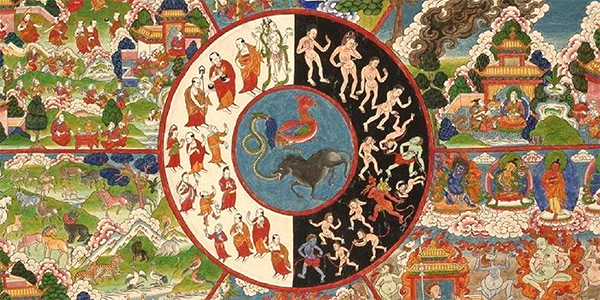
by Dr. Joe Loizzo
I recently had the pleasure of connecting (in person!) with contemplative neuroscientist David Vago and some of our mutual friends at the inaugural meeting of the International Society of Contemplative Research (ISCR) he founded with Nalanda Institute board member Doris Chang and others. Set on the lovely campus of the UC San Diego, the meeting brought together Buddhist scholars, neuroscientists, social justice researcher-activists and clinical researchers to explore the future of interdisciplinary dialogue and inquiry in the fast-growing field of contemplative science and practice.
by Joe Loizzo
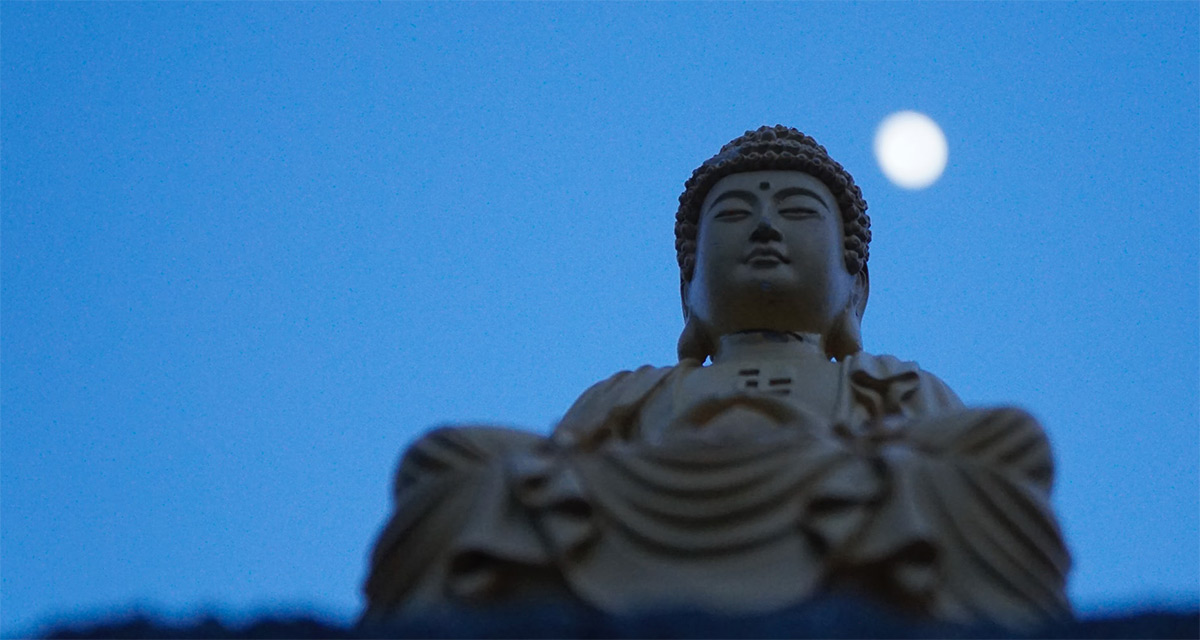
Joe Loizzo MD, PhD, is the founder and Academic Director of the Nalanda Institute for Contemplative Science. The following essay has been adapted from the forthcoming 2nd edition of Advances in Contemplative Psychotherapy to be published by Routledge in January 2023. To learn more about the Contemplative Psychotherapy Program visit our information page.
Contemplative psychotherapy is a hybrid therapeutic approach that blends the meditative insights, ethics and practices of Buddhism with the theory and application of Western neuropsychology, social psychology and psychotherapy. This amalgam may invoke cognitive dissonance for some. “Contemplation” and “contemplative” — terms derived from the Latin contemplatio — have historically been used to describe a discipline of individual and group reflection considered central to introspective learning, especially the meditative and ethical learning practiced by lay and professional people in traditional Western religious communities. Psychotherapy, on the other hand, has evolved as a healing discipline of introspective learning based mainly on a dyadic method of reflection, informed by scientific views of human nature, and practiced in confidential relationships by mental health professionals and their clients in modern clinical settings.
by Joe Loizzo

As our lives return to a new and somewhat tentative post-pandemic normal, once again we find our days filled with doing. It’s vital therefore, that we greet the summer months as a precious opportunity for just being. Whether you need to recharge and refresh, or just stop and reflect, let’s make the most of this natural pause to realign our nervous systems with the energy and chemistry of thriving and well-being.
by Joe Loizzo, MD, PhD
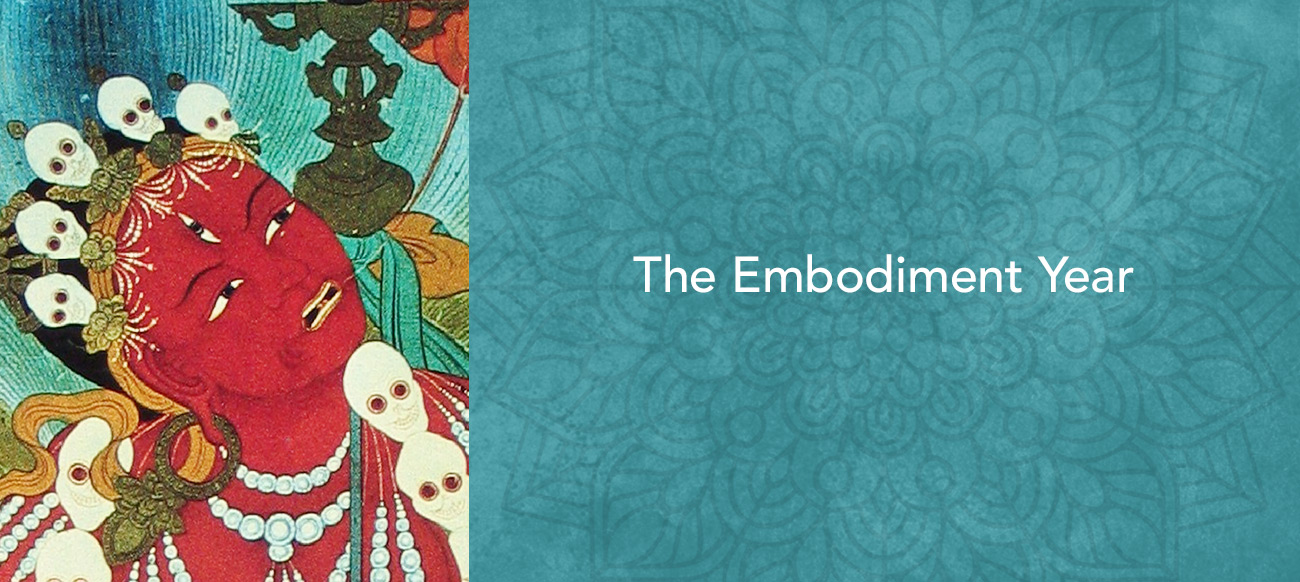
Today’s confluence of breakthrough neuropsychological research and diverse methods of mind/body health and well-being has coalesced in a new multi-disciplinary consensus and a historic confluence of distinct therapeutic approaches. Centered around a positive new science of human nature and a radically optimistic framework of plasticity, learning and change, this watershed has prompted a dialogue about mental health and well-being that not only crosses the lines between distinct schools of psychotherapy, but also the lines between Eastern and Western, ancient and modern, scientific and spiritual approaches to mind/body healing. Nowhere is the promise of this watershed more apparent than in the surprising convergence of the latest neuropsychology and embodied approaches to trauma with the timeless embodied contemplative psychology and transformational arts of the Tibetan Buddhist Tantras.
by Joe Loizzo, MD, PhD

It’s no secret that our work lives are becoming ever-more complex, fast-paced and stressful in our global, digital age. We need only look at how the COVID-19 pandemic has transformed the workplace to see how rapidly and radically the conditions of living and working in today’s fluid environment can change. At the same time, the pandemic has also laid bare pressing social and environmental needs—for true racial, gender and financial equity, and for a more sustainable economy—that demand fundamental changes in the way we think, live and lead.
by Joe Loizzo
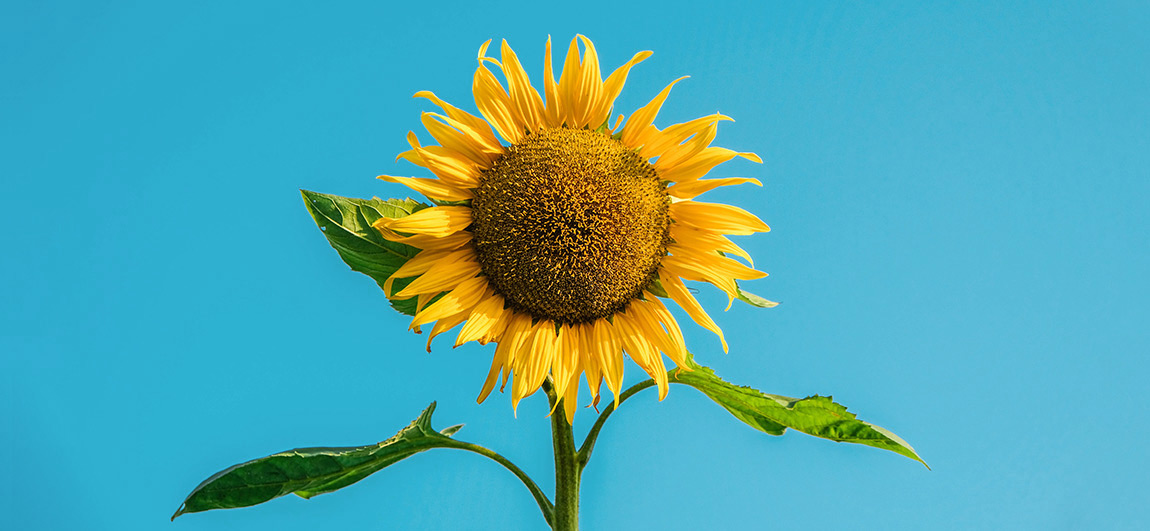
With summer here, we invite you to make more space and time to practice unwinding, whether in your favorite natural refuge—seaside or mountainside, lake or forest—on the cushion in your meditation space or in your choice reading chair or coffee nook in whatever spare minutes or hours you can clear in your day. Turn off your devices, wishing all life well, and reconnect with your own body and mind.
As you reconnect with yourself, tuning in to the natural rhythms of your body and mind, feel how precious such reflective moments are in your life. Especially invite and savor any memories that evoke a felt sense of being fully whole and alive—in harmony with yourself, nature, and the extended family of all life.
by Joe Loizzo
Usually, as summer nears, I would be sitting down to write something to celebrate our recent graduates in our Contemplative Psychotherapy and other programs. But it feels impossible to celebrate anything after watching the gut-wrenching murder of George Floyd on videotape.
As the coronavirus ravages the U.S., disproportionally impacting our black, brown and indigenous communities and revealing the unconscionable health disparities and financial inequities that expose our nation’s structural racism, we see the culture of white supremacy doubling down in the murders of Breonna Taylor, Ahmaud Arbery, Tony McDade, George Floyd and in the incendiary tweets of our president.
But as our black, brown, and indigenous leaders have taught us, this crushing onslaught is anything but new. Watching George Floyd’s life be coldly snuffed out by a seemingly average white policeman is witnessing the reenactment of centuries of cold-blooded oppression against the black and indigenous people of this land, the repetition of a collective trauma as sadistic and psychopathic as any genocide in human history.
by Joe Loizzo

Over the years since I first encountered Seven Steps for Transforming the Mind, the crown jewel of Tibet’s unique and timeless tradition of compassion training (lo-jong), it has been an unfailing source of guidance and inspiration on my own personal path, a real companion through good times and bad. Given the challenging times in which we live, I’m happy to be able to share some of its vital precepts, formulated by the Nalanda abbot Atisha Dimpamkara Shrijnana (982–1054) and recorded by Geshe Chekawa Yeshe Dorje (1101–1175), along with my own personal reflections. It’s my hope that the pointers I’ve selected from this text will help you go deeper in your practice of radical openness and life-transforming kindness, whether for yourself or others, close, neutral and far.
Precepts in italics, my comments in regular text.
![]()
“(This compassion practice) resembles the sun, a diamond, and a medicinal tree—
(It shines on all, cuts the hardest suffering, and is useful in every part).”
Within the Nalanda tradition, compassion is prized and practiced as the ground on which all human progress towards personal freedom and communal happiness stands. Compassion practice is not just for the high minded or troubled. Like the sun it brings vital warmth and light to everyone. Since it is the safest, most powerful tool for facing life’s inevitable hardship and negativity, it is like a diamond blade that cuts through the hardest blocks. And since it is entirely wholesome and endlessly beneficial, any part of this all-inclusive practice, even one precept, can be of life-giving value and life-saving help. So as far as the Tibetan masters like His Holiness the Dalai Lama are concerned, it’s not an exaggeration to say that this simple practice holds the key to all good things for all beings.
By Joe Loizzo, MD, PhD

I write this sickened by what has come to feel like a new normal: each week another outbreak of the epidemic of gut-wrenching violence that has been eating away at our body politic, increasingly in recent years. The latest blow: thirty one innocent people killed in El Paso and Dayton—including the people of color, women and Mexican nationals targeted—by two young white men infected with the violent ideologies of white nationalism and toxic masculinity. How can such tragedies happen here and now? How can families back-to-school shopping and couples on date nights be unsafe in twenty-first century America? While the voices of white blindness point the finger at mental illness or video games, mental health professionals, women, gender non-conforming individuals and people of color—for very different reasons—know better. This kind of violence is directed every minute every day at people with black or brown skin, couples of mixed race, all women, the LGBTQA+ community, refugees, immigrants and at those who practice non-Christian faiths such as Judaism, Islam and Hinduism.
By Joe Loizzo, MD, PhD

Editor’s note: Joe will be teaching a new course this fall in the Sustainable Happiness program. Learn the potent art of role-modeling imagery in the Nalanda tradition to enable deep transformation. More here.
How can a face launch a thousand ships? Why do lullabies quiet an infant’s cries? Must we be mystics to “still our beating hearts”? Over millions of lifetimes, we mammals evolved a range of special neural structures that have equipped us for an increasingly social life. Three of these help resolve a puzzle that has long stumped modern science: Why do archetypal images, prayers and gestures exert a stubborn hold even on scientifically schooled minds? Breakthroughs in the neuroscience of empathy, emotions and our conscious control of the breath have radically changed our view of our nature, helping explain the stubborn power of spiritual imagery, prayers and ritual.
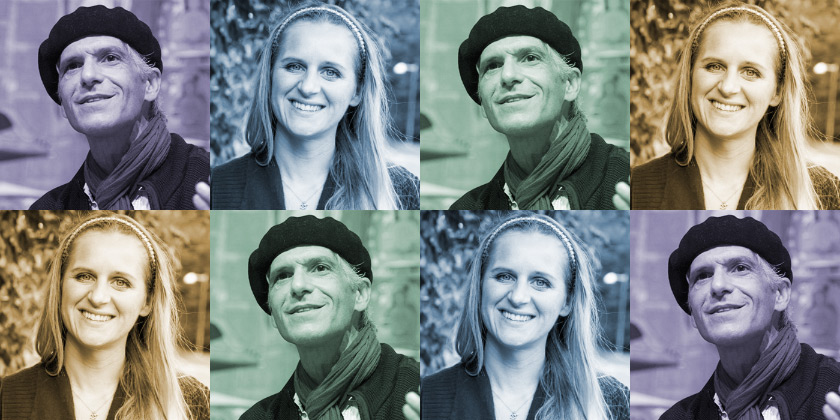
Editor’s Note: Nalanda Institute’s Director, Dr. Joe Loizzo recently sat down with Dr. Emma Seppälä for a conversation about compassion science and their hopes for the future. Dr. Seppälä is the Science Director at The Center for Compassion and Altruism Research at Stanford University. We present a small portion of their conversation here.
Dr. Seppälä is also our Guest of Honor at our 10th Annual Benefit on June 12th. Her talk entitled “Compassion Science: Healing Our Interconnected World” further explores the topics presented here. Find out more about our forthcoming benefit.
Joe Loizzo: Welcome, Emma, and thanks so much for taking the time to speak with me about your work in the science of compassion. First of all, maybe you could fill us in about how you found your way to your unusual career.
Emma Seppälä: While I was doing my master’s degree at Columbia in East Asian languages in the late 90’s, I took a class with Bob Thurman, and decided to focus on Buddhist Studies. That lead me to the seminar you gave on Science, Spirituality and Healing in the Tibetan tradition, where I remember you urged me to go to a talk at Union Seminary by Richie Davidson and Dan Goleman on meditation research, remember?
By Joe Loizzo
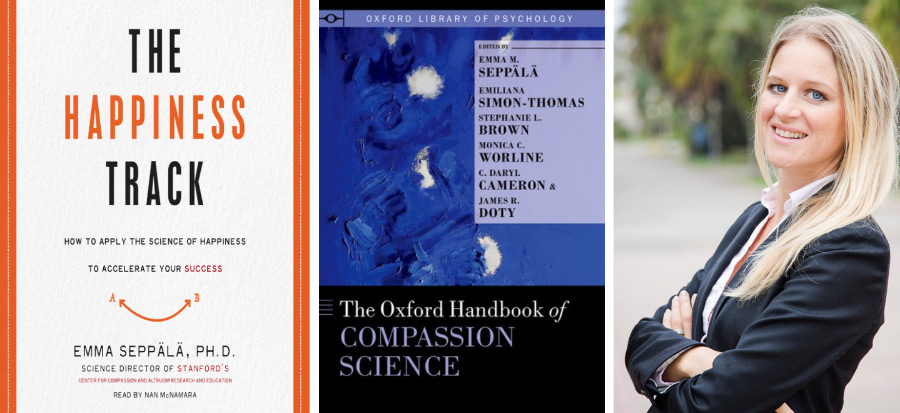
Editor’s Note: In this post Nalanda Institute’s Founder and Director, Dr. Joe Loizzo reviews two books written and edited by Dr. Emma Seppälä, this year’s Guest of Honor at our 10th Annual Benefit (June 12, 2019). As you’ll see, her writing, research, and position as Science Director of the Stanford Center for Compassion and Altruism Research aligns perfectly with Nalanda Institute’s mission. Read on to find out more about compassion in action.
Review: The Happiness Track: How to Apply the Science of Happiness to Accelerate Your Success (HarperOne, 2016), by Emma Seppälä, Ph.D.
For most of the modern age, our scientific view of human nature and our understanding of the social emotion of compassion have been drifting further and further apart. This is no accident. It reflects the widening gulf between modern science and religious ethics that has caused such a troubling divide in human culture and consciousness in our age. Specifically it reflects an intentional distortion of Darwin’s view of human “fitness” to mean that the traditional ethical values of love and compassion conflict with our natural strengths, and that such emotions are in fact sentimental weaknesses. Quietly over the last five decades, biology has begun to heal the modern divide and expose this distortion, helping us rediscover the wisdom in Darwin’s observation that “communities with the greatest number of sympathetic members would flourish best.”
View a brief video excerpt about Polyvagal Theory:
by Joe Loizzo
Recently I had the rare opportunity to interview one of the rising stars of the new neuroscience, Dr. Stephen Porges, the lone pioneer of the latest research on the unique role of the autonomic nervous system in human life. Many of you have heard me repeatedly try to convey the revolutionary impact of his work on the main neural governor of our body states, moods, mind states, and responses. So you can imagine how thrilled I was that he agreed to speak at our upcoming Annual Benefit, and to spend an hour of his time with me sharing his journey of discovery and reflecting on his work’s relevance to science, psychotherapy, contemplation, and contemporary life.
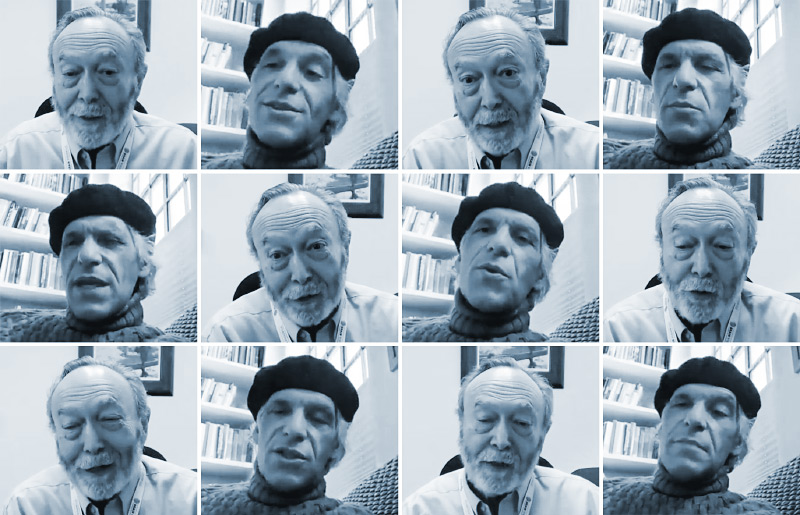
What I learned in that interview came as no surprise: Dr. Porges is the real deal, a rigorous researcher whose work is transforming our view of human physiology and health and will impact science for decades if not centuries to come. The surprise was to find that Stephen also happens to be a vital, creative child of the 1960’s—a humanist at heart who followed his passion for music deep into the evolutionary sources and innermost mysteries of human life: the healing, connective power of fearless presence, awe, and love. I’d like to share with you a few excerpts from our interview, and hope that they will whet your appetite to hear more from this inspiring pioneer at our 9th Annual Benefit on June 8th!
by Joe Loizzo
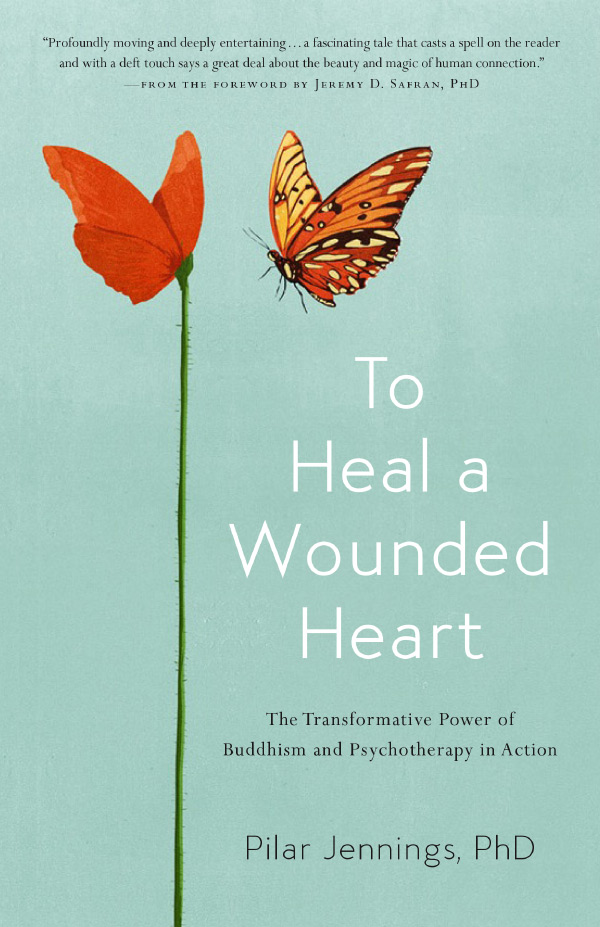 I am delighted to be able to share with you two excerpts from the exciting new book penned by our dear friend Dr. Pilar Jennings. Many of you know Pilar already from her incredibly clear and kind teaching as a core faculty member in our Sustainable Happiness Program and our Contemplative Psychotherapy Program, or from our last Annual Benefit.
I am delighted to be able to share with you two excerpts from the exciting new book penned by our dear friend Dr. Pilar Jennings. Many of you know Pilar already from her incredibly clear and kind teaching as a core faculty member in our Sustainable Happiness Program and our Contemplative Psychotherapy Program, or from our last Annual Benefit.
In To Heal a Wounded Heart, Pilar has outdone herself, bringing her incomparably wise and nurturing voice ever deeper into the intimate realm where Buddhism and psychotherapy meet to turn trauma into wholeness. We know this taste of Pilar’s heartfelt reflections on her encounters with clients and with her guru will whet your appetite for the whole feast.
To Heal a Wounded Heart: The Transformative Power of Buddhism and Psychotherapy in Action is available on Amazon*.
Two excerpts from the introduction to To Heal a Wounded Heart by Pilar Jennings
Ten years ago I made a decision I could not have anticipated in my years of training to become a psychoanalyst. I brought my Buddhist teacher and best friend into treatment with my first patient. The idea was to offer Martine, a six-year-old girl I quickly fell in love with, a sense that even the worst losses can be survived. Lama Pema knew something about grizzly loss and extreme vulnerability. As a child living in Tibet, on the eve of the Chinese invasion, he lost his country, his parents, and even a sense of self still fragile and easily dismantled. Martine’s losses were more chronic—an addicted mother who flitted in and out of her life, who tantalized her with loving but unreliable attention, and an elderly grandmother who held on tight, determined to keep her from the outside world where danger lurked.
by Joe Loizzo
In recent months and years, the young transplant of Tibetan Buddhism in the West has suffered several shocks that have shaken sapling communities in the U.S., and troubled the larger community of Buddhist orders around the world. Given the public controversy and deeply personal introspection stirred by these shocks, including the recent statement by Dzongsar Khyentse Rinpoche, I believe the time is right for us as a community to seriously reflect on what they can teach us about the global future of Tibet’s unique culture and its little understood Vajrayana form of Buddhism, also known as Buddhist Tantra.
[download the full article in PDF format]
by Joe Loizzo
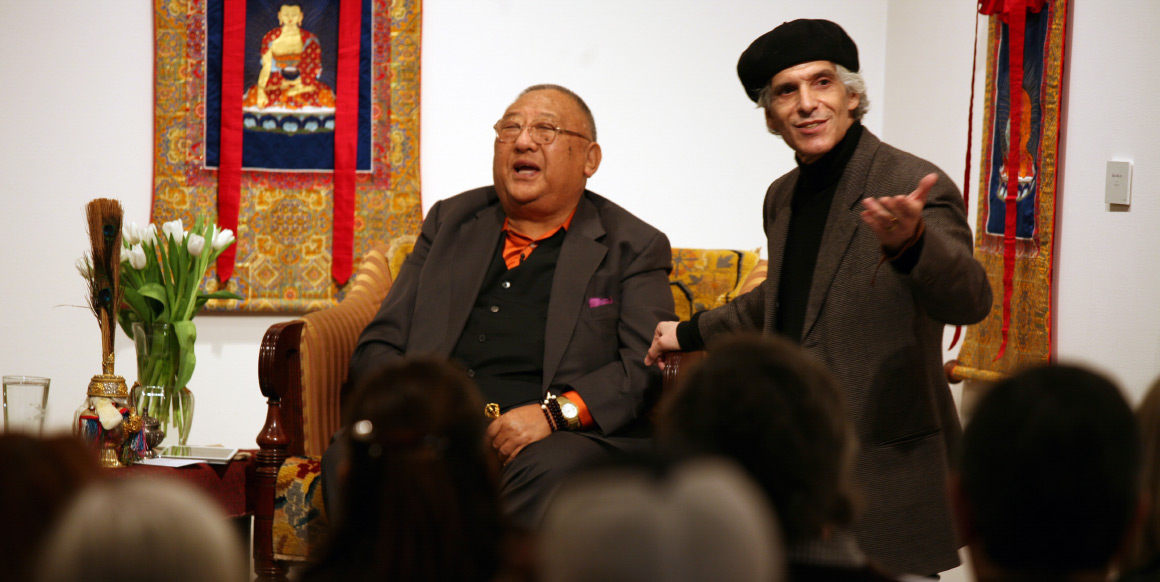
Early this year, the Tibetan community in exile and the international Buddhist community lost one of its leading lights—Kyabje Ngawang Gelek Demo Rimpoche—known to his many students around the world as Gelek Rimpoche, or simply Rimpoche, our precious gem. Besides His Holiness the Dalai Lama and Gelek’s peer, Trungpa Rimpoche, our jewel had few equals in his ability to be a living bridge between the spiritual-intellectual elite of Tibet’s Himalayan ivory towers and the increasingly global technology and pop culture of the modern West. While his preeminence among the vanishing breed of master scholars trained in the mountain kingdom alone would have merited a storied place in history, it was his unexpected role as a leading monk-exile turned lay Buddhist teacher that earned him global renown.
